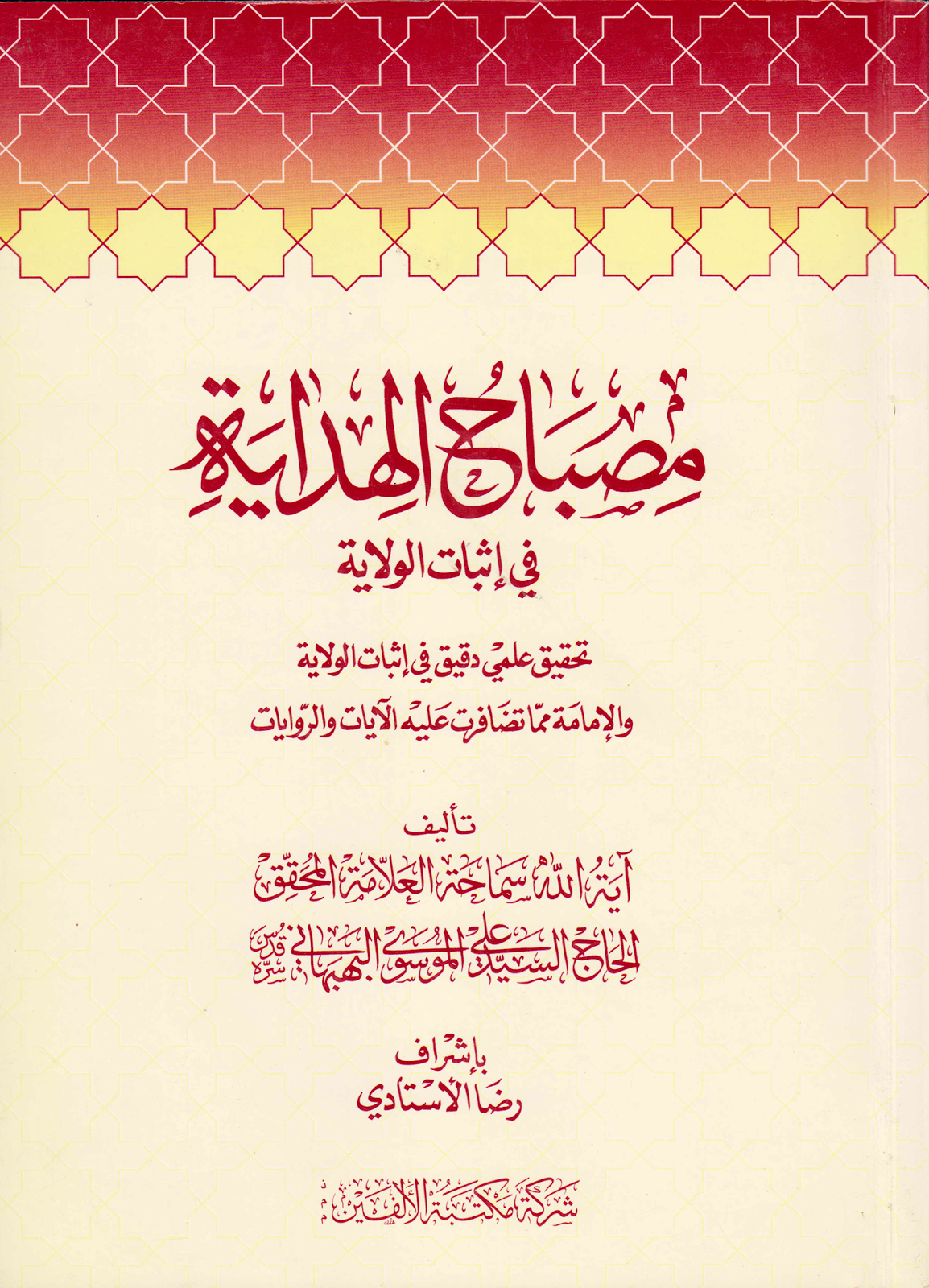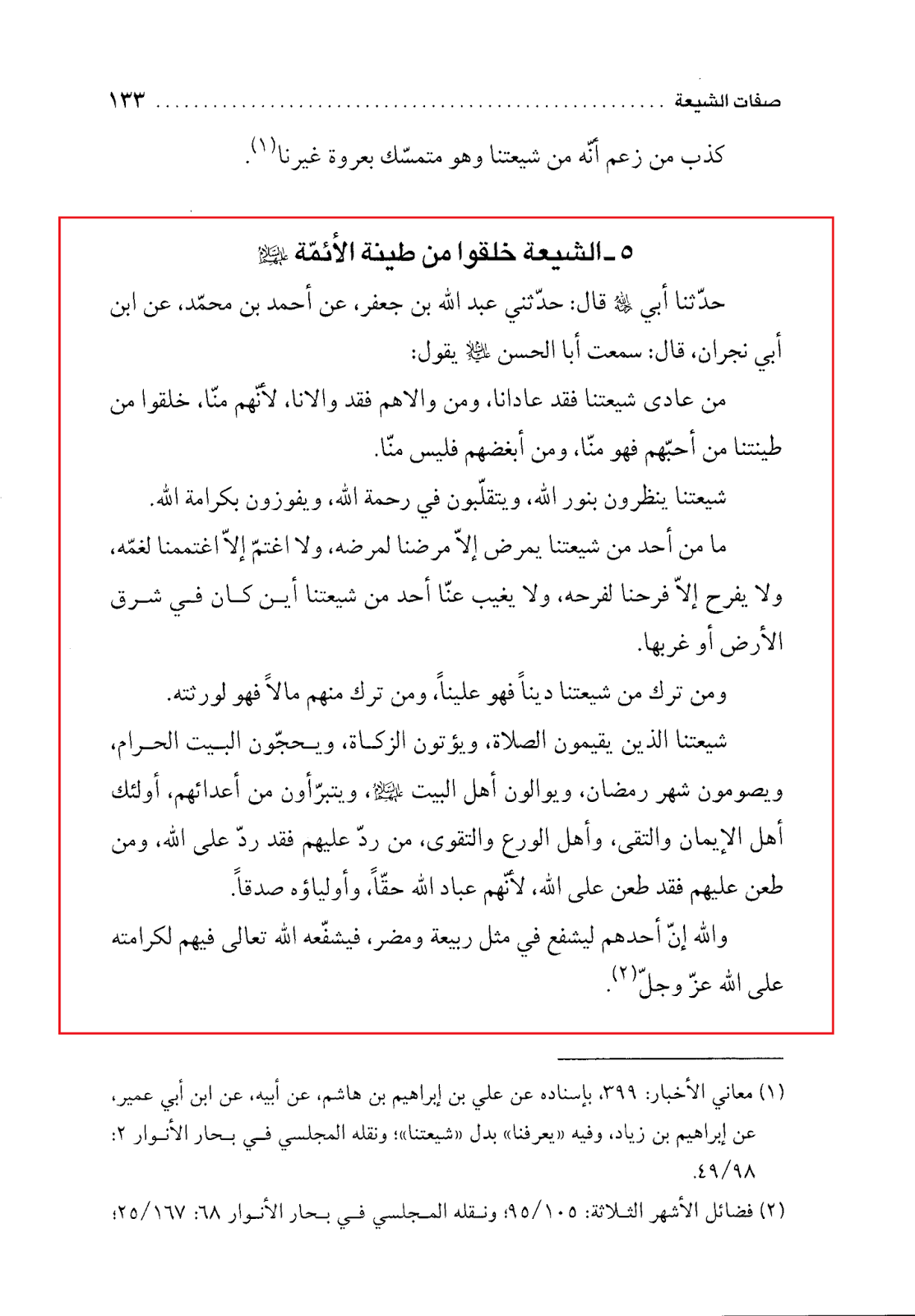Muhammad Ibn Yahya has narrated from Sa'd Ibn Abd Allah from Ibrahim Ibn Muhammad al-Thaqafi from Ali Ibn Mu‘alla from his brother, Muhammad from Durust Ibn Abu Mansur from Ali Ibn Abu Hamza from Abu Basir from Abu AbdAllah (as) who has said the following: "When the Holy Prophet, was born he remained for days without milk. Abu Talib himself breast-fed him and Allah sent milk through his nipples. It continued for several days until Abu Talib found Halima al-Sa'diya and the child was given to her."
27 - محمد بن يحيى، عن سعد بن عبد الله، عن إبراهيم بن محمد الثقفي، عن علي بن المعلى، عن أخيه محمد، عن درست بن أبي منصور، عن علي بن أبي حمزة (1) عن أبي بصير، عن أبي عبد الله عليه السلام قال: لما ولد النبي صلى الله عليه وآله مكث أياما ليس له لبن، فألقاه أبو طالب على ثدي نفسه، فأنزل الله فيه لبنا فرضع منه أياما حتى وقع أبو طالب على حليمة السعدية فدفعه إليها.
- Usul al-Kafi, Vol.1, Page 448, Hadith Number 27
Ali Ibn Ibrahim has narrated from his father from Ibn Abu Umayr from Hisham Ibn Salim from Abu Abdallah who has said the following: "Abu AbdAllah (as), has said, 'The case of Abu Talib is like the case of the people of the cave who hid their belief and expressed polytheism. Allah gave them twice as much reward.'"
28 - علي بن إبراهيم، عن أبيه، عن ابن أبي عمير، عن هشام بن سالم، عن أبي عبد الله عليه السلام قال: إن مثل أبي طالب مثل أصحاب الكهف أسروا الايمان وأظهروا الشرك فآتاهم الله أجرهم مرتين.
- Usul al-Kafi, Vol.1, Page 448, Hadith Number 28
al-Husayn Ibn Muhammad and Muhammad Ibn Yahya have narrated from Ahmad Ibn Ishaq from Bakr Ibn Muhammad al-Azdi from Ishaq Ibn Ja‘far from his father, who has said the following: "They think that Abu Talib was an unbeliever. They lied. How could he be an unbeliever when he said such words as follows: 'Do they not know that we found Muhammad as a prophet like Musa (Moses) whose name is written in the ancient books? How can Abu Talib be called an unbeliever when he has said in the following lines?" 'They certainly know that our child is not accused of speaking, - To us lies and the false words do not receive any attention. - The (beautiful) white face (of the Holy Prophet), - That prays thus, the clouds send rain, - Is the helper of the orphans and the protector of the widows.'"
29 - الحسين بن محمد ومحمد بن يحيى، عن أحمد بن إسحاق، عن بكر بن محمد الأزدي، عن إسحاق بن جعفر، عن أبيه عليه السلام قال: قيل له: إنهم يزعمون أن أبا طالب كان كافرا؟ فقال: كذبوا كيف يكون كافرا وهو يقول:
ألم تعلموا أنا وجدنا محمدا * نبيا كموسى خط في أول الكتب وفي حديث آخر كيف يكون أبو طالب كافرا وهو يقول:
لقد علموا أن ابننا لا مكذب * لدينا ولا يعبأ بقيل الا باطل (1) وأبيض يستسقى الغمام بوجهه * ثمال اليتامى عصمة للأرامل
- Usul al-Kafi, Vol.1, Page 448-449, Hadith Number 29


Ali Ibn Ibrahim has narrated from his father from Ibn Abu ‘Umayr from Hisham Ibn al-Hakam from Abu AbdAllah, who has said the following: "Once when the Holy Prophet, was in the sacred Mosque wearing new clothes, the pagans threw the contents of the stomach of camel on him and his new clothes were ruined. Allah knows how hard it was for him. He (the Holy Prophet) went to Abu Talib and asked, ‘What is my honor worth to you?’ He asked, ‘What is the matter, O son of my brother?’ The Holy Prophet, informed him of the incident. Abu Talib, while picking up a sword, called and asked Hamza to take up arms. He then asked Hamza to pick up the stomach of the camel and they came to the people along with the Holy Prophet. They found people of Quraysh around the Ka‘ba. When they saw him (Abu Talib) they read trouble from his face. Abu Talib asked Hamza to spread the contents of the stomach of the camel against everyone’s mustache and Hamza did so to the last person. Abu Talib then turned to the Holy Prophet and said, ‘Son of my brother, this is how much we value your honor (ready to face such great risk for it)."
30 - علي بن إبراهيم، عن أبيه، عن ابن أبي عمير، عن هشام بن الحكم، عن أبي عبد الله عليه السلام قال: بينا النبي صلى الله عليه وآله في المسجد الحرام وعليه ثياب له جدد فألقى المشركون عليه سلا ناقة فملؤوا ثيابه بها، فدخله من ذلك ما شاء الله فذهب إلى أبي طالب فقال له: يا عم كيف ترى حسبي فيكم؟ فقال له: وما ذا يا ابن أخي؟ فأخبره الخبر، فدعا أبو طالب حمزة وأخذ السيف وقال لحمزة: خذ السلا ثم توجه إلى القوم والنبي معه فأتى قريشا وهم حول الكعبة، فلما رأوه عرفوا الشر في وجهه، ثم قال لحمزة: أمر السلا على سبالهم (2) ففعل ذلك حتى أتى على آخرهم، ثم التفت أبو طالب إلى النبي صلى الله عليه وآله فقال: يا ابن أخي هذا حسبك فينا.
- Usul al-Kafi, Vol.1, Page 449, Hadith Number 30
Ali has narrated from his father from Ibn Abu Nasr from Ibrahim Ibn Muhammad
al-Ash‘ari from ‘Ubayd Ibn Zurara from Abu Abdallah, who has said the following: "When Abu Talib (as) passed away, Jibril came to the Messenger of Allah and said, ‘O Muhammad, migrate from Makka. There is no one to help protect you.’ Quraysh revolted against the Holy Prophet, and he came out of Makka running away until he reached one of the mountains of Makka, called al-Hajun. He went there."
1 3 - علي، عن أبيه، عن ابن أبي نصر، عن إبراهيم بن محمد الأشعري، عن عبيد بن زرارة، عن أبي عبد الله عليه السلام قال: لما توفى أبو طالب نزل جبرئيل على رسول الله صلى الله عليه وآله فقال: يا محمد اخرج من مكة، فليس لك فيها ناصر، وثارت قريش بالنبي صلى الله عليه وآله، فخرج هاربا حتى جاء إلى جبل بمكة يقال له الحجون فصار إليه.
- Usul al-Kafi, Vol.1, Page 449, Hadith Number 31
Ali Ibn Muhammad Ibn Abdallah and Muhammad Ibn Yahya have narrated
from Muhammad Ibn ‘Abd Allah [...] from Abu Abdallah who has said the following: "Abu Talib acknowledged Islam through the expression of al-Jummal, a universal language. (Al-Jummal is a system wherein each letter of the alphabet is given a certain numerical value and instead of a letter its numeric value s used for secrecy or other reasons). The Imam said, 'He used a universal language.'"
32 - علي بن محمد بن عبد الله، ومحمد بن يحيى، عن محمد بن عبد الله رفعه، عن أبي عبد الله عليه السلام، قال: إن أبا طالب أسلم بحساب الجمل؟ قال: بكل لسان.
- Usul al-Kafi, Vol.1, Page 449, Hadith Number 32
Muhammad Ibn Yahya has narrated from Ahmad and Abdallah sons of Muhammad Ibn Isa from their father from Abdallah Ibn al-Mughira from Isma‘il Ibn Abu Ziyad from Abu Abdallah (as) who has said the following: "Abu Talib acknowledged Islam through the expression of al-Jummal. He formed number sixty-three with his hands."
33 - محمد بن يحيى، عن أحمد وعبد الله ابني محمد بن عيسى، عن أبيهما، عن عبد الله بن المغيرة، عن إسماعيل بن أبي زياد، عن أبي عبد الله عليه السلام قال: أسلم أبو طالب بحساب الجمل وعقد بيده ثلاثا وستين.
al-Hussein Ibn Muhammad has narrated from Muhammad Ibn Yahya al-Farisiy from Abu Hanifa Muhammad Ibn Yahya from al-Walid Ibn Aban from Muhammad Ibn Abdallah Ibn Muskan from his father who has said the following: "Abu Abdallah (as) has said, ‘Once Fatimah Bint Assad came to Abu Talib with the glad news of the birth of the Holy Prophet. Abu Talib said, ‘Wait for a sabt, then I will give you similar glad news, except prophet-hood (the new born will not be a prophet).’ “The Imam has said, ‘A sabt is thirty years. Amir al-Mu’minin Ali, was born thirty years after the birth of the Messenger of Allah."
1 - الحسين بن محمد، عن محمد بن يحيى الفارسي، عن أبي حنيفة محمد بن يحيى، عن الوليد بن أبان، عن محمد بن عبد الله بن مسكان، عن أبيه قال: قال أبو عبد الله عليه السلام: إن فاطمة بنت أسد جاءت إلى أبي طالب لتبشره بمولد النبي صلى الله عليه وآله فقال أبو طالب: اصبري سبتا (2) أبشرك بمثله إلا النبوة، وقال: السبت ثلاثون سنة وكان بين رسول الله صلى الله عليه وآله وأمير المؤمنين عليه السلام ثلاثون سنة.













































